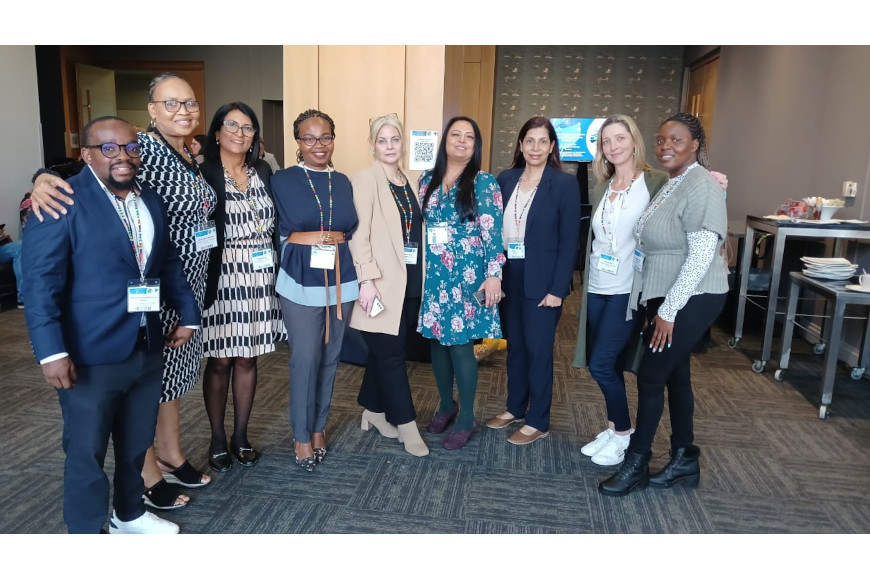The Durban University of Technology (DUT) in collaboration with the University of KwaZulu-Natal (UKZN) recently co-hosted the 22nd annual conference of the Southern African Association of Health Educationalists (SAAHE) at Gateway Hotel in Umhlanga, Durban. This conference is a prestigious annual event for academics, researchers, and healthcare practitioners in Southern Africa who train students in medicine and allied healthcare. The conference’s primary goal is to sustain and enrich dialogue in the various domains of health science education throughout Southern Africa. Furthermore, there is a strong emphasis on promoting interprofessional collaboration and communication in health professional education and practice
The SAAHE 2024 conference, under the theme “Decoding and recoding to transform for contextually relevant health professions education,” gathered academics, professors, researchers, and healthcare practitioners from across Southern Africa and internationally. This theme highlights the necessity to reconsider and redesign the education of health professionals in response to the constantly evolving healthcare landscape. Keynote speakers included Professor Thirusha Naidu (UKZN), Professor Olle ten Cate (UMC Utrecht, Netherlands), Professor Subha Ramani (AMEE President), Professor Champion Nyoni (University of Free State), and Professor Tshilidzi Marwala from the United Nations University, Japan.
Professor Marwala’s keynote on: Maintaining the Equilibrium between Humanity and AI in Healthcare resonated deeply with the attendees, emphasising the need for healthcare systems to adapt policies to integrate Artificial Intelligence (AI)-driven innovations while maintaining patient-centred care. He highlighted AI’s role, particularly through chatbots, in enhancing patient education.
Dr Pavitra Pillay, Deputy Dean of DUT’s Faculty of Health Sciences, also a SAAHE Council member, chaired the last session of the conference, in which she expressed her excitement about DUT having a strong presence at this SAAHE conference and extended her gratitude to all the stakeholders for their immense contribution to it success. This conference received sponsorship from the DUT RIE, CELT, Cooperative Education Unit and the Faculty of Health Sciences.
“This is my first SAAHE conference and I enjoyed it. From now on I will be part of many to come. I hope you will implement at least one or two ideas you have gained from this conference. We are very proud and thankful for your contributions which made this conference a great one. To the DUT, and UKZN organising team, and everyone, thank you,’’ she said.
Dr Pillay as incoming chair of the SAAHE Awards subcommittee, also presented the prestigious SAAHE Distinguished Educator Award to Professor Champion Nyoni (University of Free State) who delivered a keynote address on: “Connecting Disconnected Priorities: Embracing Context”. She also presented the Best Publisher Award to Jennifer Watermeyer and the best poster award was presented to Marvin Jansen.
A highlight of the event was a spirited student debate on “The use of Artificial Intelligence in Health Professions Education,” moderated by Professor Werner Cordier, involving students from UKZN.
The DUT Faculty of Health Sciences staff also presented and chaired some of the sessions during the conference. Prof Poovendhree Reddy chaired the Curriculum Development and Reform session, Dr Rosaley Prakaschandra chaired the session on Service and Experiential Learning while the e-poster presentation session was chaired by Ms. Nomakhosi Mpofana.
Pavitra Pillay and colleagues, Dr Kerrin Begg and Dr Mavis Kekana from the South African Committee of Health Sciences Deans (SACoHSD) facilitated a workshop entitled “Interprofessional Education and Collaborative Practice (IPECP) -how far have we come?” The main focus of this workshop was to collate our present understanding of IPECP and map the progress attained thus far.
Among those who presented during the conference was Mr Xolani Mhlongo: “Enhancing Research Supervision Skills among Nurse Educators in the Public Nursing Colleges”. Dr Nellie Naranjee focused on “Curricular reforms to integrate Artificial intelligence into Nursing Education programmes”. Dr Rosaley Prakaschandra also presented her findings on “Exploring COIL as an authentic learning pedagogy” Dr Dudu Sokhela gave insight into “Innovative teaching and learning through collaborative online international learning. A case of the nursing department at the Durban University of Technology”. Dr Thandokuhle Khoza spoke on: The use of desktop virtual software for the clinical training of Radiography students at the Durban University of Technology”. Mrs Dorinda Borg shared her findings on “The application of design thinking in a case study integrating complementary therapies as an intervention treatment to reduce anxiety for adults with autism spectrum disorders”. Dr Poovanesthree Padayachee spoke on: New curriculum and capacity development interventions for research: “Guidelines to enhance the nurse educator’s contextually relevant pedagogical methods in research education”. A presentation entitled” “Cheating without shame: Health sciences student insight into academic integrity during emergency remote teaching” was presented by Dr Colette Kell.
The conference underscored the importance of ongoing dialogue and collaboration in health science education, aiming to enrich practices and foster interprofessional communication.
Pictured: From left to Right: Dr Thandokuhle Khoza, Dr Dudu Sokhela, Dr Pavitra Pillay, Ms Nomakhosi Mpofana, Ms Dorinda Borg, Dr Rosaley Prakaschandra, Prof Poovendhree Reddy, Dr Colette Kell and Ms Mokgadi Makgobole.
Vukani Langa

